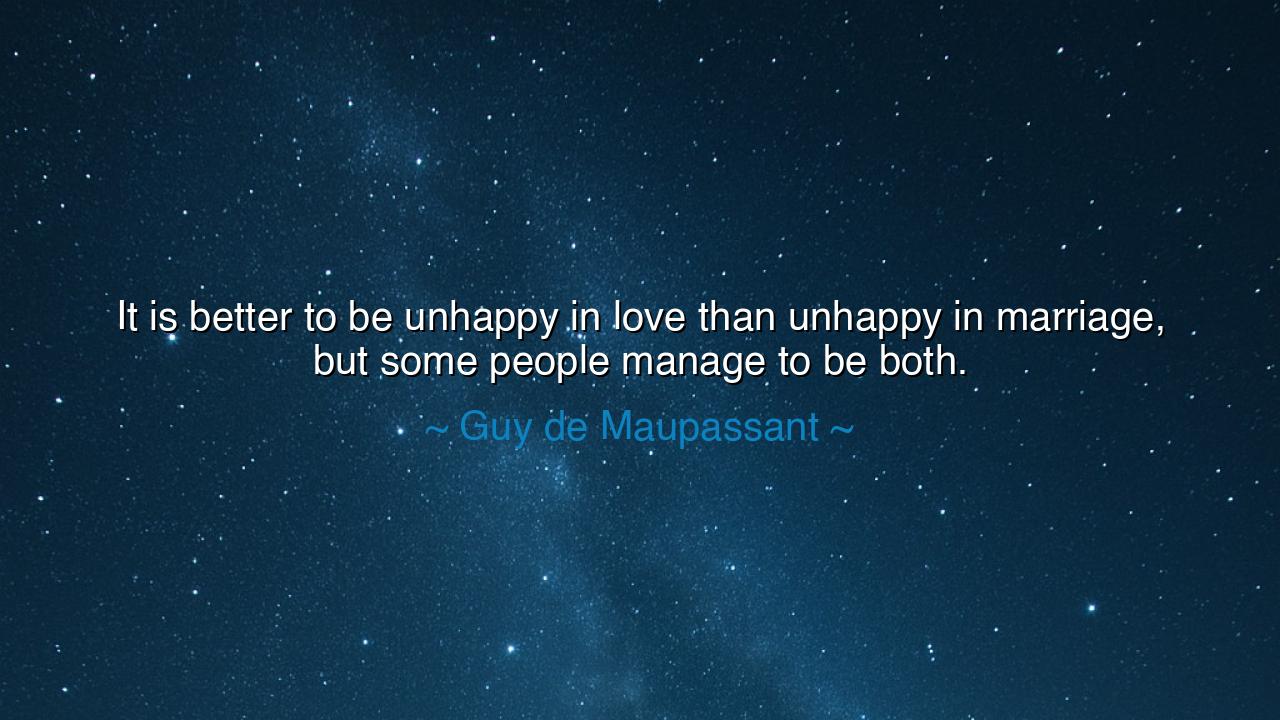
It is better to be unhappy in love than unhappy in marriage, but
It is better to be unhappy in love than unhappy in marriage, but some people manage to be both.






“It is better to be unhappy in love than unhappy in marriage, but some people manage to be both.” — so spoke Guy de Maupassant, the master of irony and the chronicler of the human heart. His words rise from the ashes of human folly, from the laughter and tears of those who mistook passion for permanence, or loneliness for love. In this saying, he offers not cynicism, but a truth hard-earned through centuries of human yearning: that to bind oneself in the chains of a false union is a sorrow deeper than the fleeting pain of a broken heart.
In the realm of love, suffering can be noble. To love and be unhappy is to taste the bittersweet elixir of longing, to confront the ache of being alive. It is a sadness that purifies the soul, for in it one learns the measure of one’s own heart — its strength, its vulnerability, its capacity for tenderness. But to be unhappy in marriage is another matter altogether; it is to live daily with a ghost, to sit beside one who was once a dream and has now become a stranger. Love’s grief may wound once, sharply and cleanly, but marriage’s misery festers like a slow poison.
Maupassant, who saw through the veils of society, wrote in an age when marriage was less a covenant of hearts and more a transaction of convenience, a performance upheld for appearances. He had seen men and women trapped behind the gilded bars of their own vows, chained not by devotion but by fear — fear of scandal, fear of solitude, fear of facing themselves. Thus he wrote these words as both warning and lament: it is better to suffer the pangs of lost love than to rot within the walls of a loveless home. For the former leaves one free to heal; the latter leaves one enslaved to despair.
Consider the fate of Queen Catherine of Aragon, whose marriage to King Henry VIII became a theater of anguish. Once bound by love and duty, she watched her husband’s affection fade like light in a dying flame. He sought another, and another still, yet Catherine clung to her vows, believing that endurance was virtue. History remembers her dignity, but it also remembers her sorrow — the sorrow of a woman unhappy in marriage, yet too faithful to flee. Her suffering was not born of love’s loss, but of love’s imprisonment. And so we see the truth of Maupassant’s words written not in ink, but in tears.
The unhappy lover walks in freedom, even amid heartache. They may cry out to the stars, but the night sky still belongs to them. The unhappy spouse, however, walks within invisible walls — each day a repetition of the same dull ache, each smile a mask. There is no glory in such endurance, only the slow erosion of spirit. The ancients taught that the truest bonds are not forged by law, but by mutual fire — by the recognition of two souls that choose each other freely, again and again. When that choice dies, so too does the sanctity of the bond.
Yet we must not despair. For Maupassant’s warning is also a call to wisdom: choose love not out of loneliness, nor marriage out of haste. Seek not the safety of convention, but the honesty of connection. When love calls, let it test you. Let it wound, if it must — for pain in love is a mark of courage, proof that you dared to feel deeply in a shallow world. But when marriage calls, listen twice, thrice, a hundred times, and ask yourself: “Does this bond nourish my spirit, or does it merely quiet my fear?” For to wed without truth is to chain oneself to an echo.
The lesson, then, is simple yet profound: do not confuse comfort with happiness, nor duty with love. True union is not the merging of two bodies, but the meeting of two destinies that walk side by side, equal in spirit, unafraid of truth. If your heart must break, let it break in love — not in the slow death of a false marriage. And if you would live wisely, seek not perfection in another, but authenticity in both.
So remember, O seeker of the heart: better the honest sorrow of love than the polite misery of a lie. Let your love be chosen in freedom, and your vows made in truth. For the one who dares to love with open eyes may suffer, yes — but the one who marries without seeing suffers forever.






AAdministratorAdministrator
Welcome, honored guests. Please leave a comment, we will respond soon